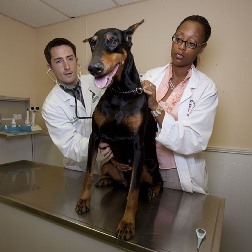How to Select a Veterinary Technician School in Delaware
 Achieving your long term dream of working with and helping pets by enrolling in a vet school in Delaware might at first feel like a daunting undertaking. After all, you must locate and enroll in a school that will furnish the appropriate training so that you can be successful as a vet technician, assistant or technologist. But just how do you tackle assessing and contrasting colleges so that you can make the ideal choice? Many future students start their due diligence process by searching for colleges that are close to their residences. After they have located some area colleges, they determine which ones have the lowest tuition and hone in on those. Although location and cost are significant considerations when evaluating vet tech schools, they are by no means the only significant ones when making your evaluations. Qualifiers such as accreditation and internship programs need to be considered also. The main idea is that there are questions you ought to be asking the veterinary tech programs you are looking at before you make an ultimate decision. We have provided several in this article in order to help get you started, but before we discuss them we’ll talk about the various roles of veterinary techs and assistants and the training alternatives available.
Achieving your long term dream of working with and helping pets by enrolling in a vet school in Delaware might at first feel like a daunting undertaking. After all, you must locate and enroll in a school that will furnish the appropriate training so that you can be successful as a vet technician, assistant or technologist. But just how do you tackle assessing and contrasting colleges so that you can make the ideal choice? Many future students start their due diligence process by searching for colleges that are close to their residences. After they have located some area colleges, they determine which ones have the lowest tuition and hone in on those. Although location and cost are significant considerations when evaluating vet tech schools, they are by no means the only significant ones when making your evaluations. Qualifiers such as accreditation and internship programs need to be considered also. The main idea is that there are questions you ought to be asking the veterinary tech programs you are looking at before you make an ultimate decision. We have provided several in this article in order to help get you started, but before we discuss them we’ll talk about the various roles of veterinary techs and assistants and the training alternatives available.
The Job of a Vet Assistant and Technician
 One of the initial decisions that you will need to make is whether you want to train as a vet assistant, technologist or technician. Part of your determination may be dependent on the amount of time and money that you have to commit to your education, but the primary factor will most likely be which specialty interests you the most. What vet techs and assistants share in common is that they all work under the direct guidance of a practicing and licensed veterinarian. And while there are many functions that they can carry out within the Delaware veterinary clinic or hospital, they can’t prescribe medicines, diagnose conditions, or carry out surgical procedures. In those areas they may only provide assistance to a licensed veterinarian. There are technicians and technologists that work away from the typical veterinarian practice, for example for animal shelters, zoos or police departments. Let’s take a look at the job functions and education requirements for each specialty.
One of the initial decisions that you will need to make is whether you want to train as a vet assistant, technologist or technician. Part of your determination may be dependent on the amount of time and money that you have to commit to your education, but the primary factor will most likely be which specialty interests you the most. What vet techs and assistants share in common is that they all work under the direct guidance of a practicing and licensed veterinarian. And while there are many functions that they can carry out within the Delaware veterinary clinic or hospital, they can’t prescribe medicines, diagnose conditions, or carry out surgical procedures. In those areas they may only provide assistance to a licensed veterinarian. There are technicians and technologists that work away from the typical veterinarian practice, for example for animal shelters, zoos or police departments. Let’s take a look at the job functions and education requirements for each specialty.
- Vet Assistants in most cases will have undergone a formal training program, either as an intern or apprentice in a practice, or by completing a certificate program at a trade school or community college in Delaware. As the name implies, their job function is to assist the veterinarians and vet techs in the execution of their duties. Usually they are not associated with more complex undertakings, for example assisting with surgeries. Some of their normal responsibilities may include working at the front desk, preparing and cleaning examination rooms and equipment, or controlling pets during examinations.
- Vet Technicians get more advanced training compared to assistants and normally acquire a 2 year Associate Degree, ideally from an American Veterinary Medical Association (AVMA) accredited program. They are in a fashion the veterinary equivalent of medical nurses, since their fundamental job duty is to assist veterinarians with diagnosing and treating animal patients. Where they differ from veterinary assistants is that they are involved in more involved activities, such as assisting with surgeries or administering medication. All states currently mandate that vet technicians pass a credentialing examination for either certification, registration or licensing.
- Vet Technologists are similar to veterinary techs and for the most part carry out the same work functions. They are required to attain a Bachelor’s Degree in veterinary technology, which normally takes 4 years to complete. So the main distinction between a vet technologist and a technician is the technologist’s higher level of education. But with an advanced degree comes more job options, higher salaries and potential management positions. They are additionally mandated to pass a credentialing exam for either registration, certification or licensing.
Vet techs and technologists can specialize in areas such as anesthesia, internal medicine or emergency care. A number may receive certification from the American Association for Laboratory Animal Science (AALAS) to work in labs or Delaware research facilities also.
Online Vet Colleges
 An option that may be a solution for those with a busy lifestyle or who are working full time while going to veterinary school is to enroll in an online program. Since the classes are offered via the internet, students can study on their own schedule wherever a computer is available. The course of study is taught using several methods, including videos, slide shows and live streaming webinars. And since the majority of veterinary technician and technologist degrees require clinical training, that part can normally be carried out as an internship or work study program at an area Delaware veterinary clinic or hospital. Distance learning, as it is also called, may in many instances reduce the cost of your education. Tuition and supplementary costs, for instance for travel and study materials, may be lower compared to more traditional classroom programs. Just be sure that the program that you select is accredited, either by the AVMA or another nationally certified accrediting agency. With the online classes and the practical training, everything is furnished for a comprehensive education. So if you are disciplined enough to learn in this more self-reliant fashion, an online veterinary technician or assistant program may be the perfect option for you.
An option that may be a solution for those with a busy lifestyle or who are working full time while going to veterinary school is to enroll in an online program. Since the classes are offered via the internet, students can study on their own schedule wherever a computer is available. The course of study is taught using several methods, including videos, slide shows and live streaming webinars. And since the majority of veterinary technician and technologist degrees require clinical training, that part can normally be carried out as an internship or work study program at an area Delaware veterinary clinic or hospital. Distance learning, as it is also called, may in many instances reduce the cost of your education. Tuition and supplementary costs, for instance for travel and study materials, may be lower compared to more traditional classroom programs. Just be sure that the program that you select is accredited, either by the AVMA or another nationally certified accrediting agency. With the online classes and the practical training, everything is furnished for a comprehensive education. So if you are disciplined enough to learn in this more self-reliant fashion, an online veterinary technician or assistant program may be the perfect option for you.
Questions to Ask Veterinary Assistant and Technician Programs
 At this point you should have selected which veterinary credential that you want to obtain, and if you prefer to study online or attend a program on campus. Since there are an abundance of veterinary community colleges, vocational and technical schools in Delaware and across the United States, you must ask some important questions to help narrow down your list of alternatives. As we mentioned in our introduction, many future students start by focusing on location and the cost of tuition. But we have already mentioned other important qualifiers, which include internship programs and accreditation. And naturally you want to choose a college that offers the specialty and degree that you would like to earn. These and other factors are reviewed in the list of questions that you need to ask the vet assistant and technician colleges that you are considering.
At this point you should have selected which veterinary credential that you want to obtain, and if you prefer to study online or attend a program on campus. Since there are an abundance of veterinary community colleges, vocational and technical schools in Delaware and across the United States, you must ask some important questions to help narrow down your list of alternatives. As we mentioned in our introduction, many future students start by focusing on location and the cost of tuition. But we have already mentioned other important qualifiers, which include internship programs and accreditation. And naturally you want to choose a college that offers the specialty and degree that you would like to earn. These and other factors are reviewed in the list of questions that you need to ask the vet assistant and technician colleges that you are considering.
Is the Vet Program Accredited? It’s essential that you confirm that the vet assistant or technician school you select is accredited by a regional or national accrediting organization. As previously discussed, among the most highly respected is the American Veterinary Medical Association (AVMA). Vocational schools and colleges that are accredited by the AVMA have undergone a rigorous review process that ensures you will get a superior education. Also, accreditation is important if you are applying for a student loan or financial assistance, since many programs are not offered for non-accredited schools. Last, having a certificate or degree from an accredited college is often a precondition for employment for many Delaware vet clinics and hospitals.
What is the College’s Reputation? The vet trade school or college and program you enroll in must have an exceptional reputation within the vet field. You can start your due diligence by asking the schools you are reviewing for endorsements from the employers in their job placement network. Other pointers include checking with online school ranking websites and checking with the school’s accrediting organizations as well. You can ask the Delaware school licensing authority if there have been any grievances or violations regarding your targeted schools. As a final tip, call some veterinarians that you might wish to work for after you receive your training. Find out what they think of your school selections. They might even suggest some schools not on your list.
Are Internships Offered? The best way to obtain practical hands on training as a vet tech or assistant is to work in a clinical setting. Find out if the programs you are considering have internship programs established with local veterinarians, vet practices or hospitals. The majority of veterinary medicine programs require practical training and a large number provide it through internships. Not only will the experience be invaluable as far as the clinical training, but an internship can also help develop associations in the local Delaware veterinary community and help in the search for a position after graduation.
Is Job Placement Offered? Searching for a job after graduating from a veterinary assistant or tech program can be difficult without the assistance of a job placement program. To start with, find out what the graduation rates are for the colleges you are considering. A lower rate may signify that the teachers were ineffective at teaching the curriculum or that a number of students were disappointed with the program and quit. Next, check that the colleges have a job placement program and find out what their placement rates are. A high placement rate could indicate that the Delaware school has an exceptional reputation within the vet community and has a significant network of contacts for student placements. A low rate may mean that the training is not highly thought of by employers or that the job assistance program is a failure at placing students.
How Large are the Classes? If the classes are larger sized, you may receive little or no one-on-one instruction from the teachers. Find out from the Delaware colleges you are looking at what their class teacher to student ratios are. You may also want to attend a couple of classes (if practical) to monitor the interaction between instructors and students. Get evaluations from students concerning the quality of instruction. Also, speak with the instructors and determine what their backgrounds are as well as their methods of teaching.
Where is the College Located? Yes, we already talked about location, but there are a couple of more points to consider on the topic. If you are planning to drive to your veterinary tech classes from home or work, you must make sure that the driving time fits into your schedule. For instance, driving during the weekend to investigate the route won’t be the same as the commute during rush hour traffic, especially if the Delaware campus is located close by or within a larger city. In addition, if you do decide to attend a school in another state or even outside of your County of residence, there may be increased tuition fees especially for state and community colleges. On the other hand, attending online classes might be an option that will provide you with more flexibility and reduce the necessity for travel.
Do the Classes Fit Your Schedule? And last, it’s imperative that you determine if the Delaware veterinarian schools you are evaluating offer class times flexible enough to accommodate your schedule. For example, a number of students continue working full time and can only attend classes on the weekends or in the evenings. Others might only be able to attend classes in the morning or in the afternoon. Make sure that the class times you need are offered prior to enrolling. Also, determine if you can make-up classes that you may miss as a result of sickness, work or family emergencies. You may discover that an online school is the best way to fit your veterinary training into your active life.
Enroll in the Right Veterinary Technician Program in Delaware
Selecting the right veterinary assistant or tech school is an important first step to starting a gratifying career providing care and treatment for animals. Future students thinking about veterinary assistant or tech programs must make their selection based on a number of key issues. Veterinary techs, assistants and technologists work in veterinary clinics and hospitals and animal shelters. They typically take on administrative responsibilities and assist the veterinarian with the animal patients when needed. As we have covered, it’s very important that you enroll in a veterinary medicine program that is both accredited and has an excellent reputation within the profession. This goes for vet tech online colleges as well. By asking the questions provided in our checklist for reviewing schools, you will be able to narrow down your options so that you can make your final selection. And by picking the ideal program, you can achieve your goal of becoming a veterinary technician, assistant or technologist.
